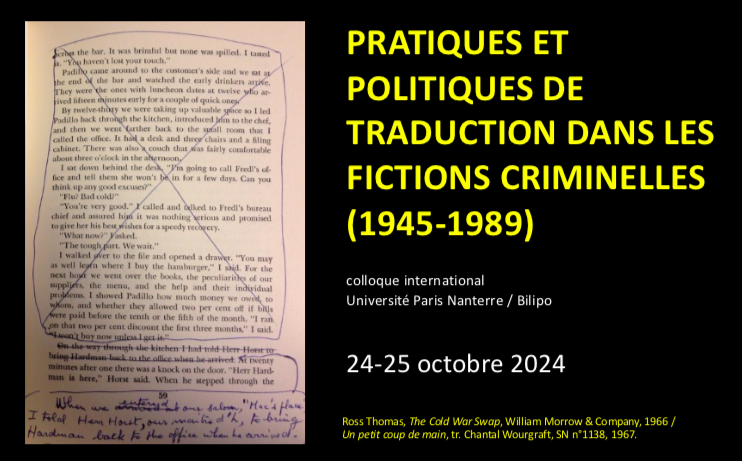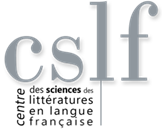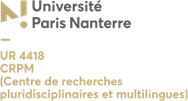- Recherche - LLS,
Pratiques et politiques de traduction dans les fictions criminelles (1945-1989)
Publié le 24 avril 2024
–
Mis à jour le 17 octobre 2024

Date(s)
du 24 octobre 2024 au 25 octobre 2024
SCROLL DOWN FOR ENGLISH VERSION
Organisé dans le cadre du projet ANR POLARisation (https://polarisation.hypotheses.org/), en collaboration avec le Centre des Sciences des Littératures en Langue Françaises (CSLF), le Centre de Recherches Anglophones (CREA) et le Centre de Recherches Pluridisciplinaires Multilingues de l’Université Paris Nanterre (CRPM), le colloque entend éclairer le rôle de la traduction dans la formation et l’affirmation des collections de littérature policière et la perception des principales orientations du genre policier entre 1945 et 1989.
Bon nombre de collections, telles « Le Masque », la « Série Noire » et « Un Mystère » ont dû leur essor à la traduction de romans étrangers, majoritairement britanniques et américains. La traduction a façonné l’identité de ces collections et, à travers elle, conditionné une certaine perception de la fiction criminelle et de ses principales catégories génériques. Les romans publiés y sont généralement le résultat d’une série d’opérations de sélection, de coupe, de réécriture, de domestication et de nivellement culturel et linguistique qu’une double analyse du système des traductions fait apparaître, en reconstruisant les conditions matérielles du processus de traduction ou en étudiant les choix traductifs au niveau linguistico-textuel.
Etant donné la prépondérance de ces pratiques dans l’édition française, l’absence, ou la faible proportion, de traductions dans d’autres séries (comme « Spécial Police » ou « Espionnage » des éditions Fleuve Noir) peut s’interpréter comme un geste de refus, face au tropisme anglosaxon, de leurs grandes concurrentes de l’époque. Envisagé sous cet angle, le champ entier de l’édition française de littérature criminelle apparaît sous influence étrangère, conditionné par des pratiques et des politiques de traduction/non-traduction d’un genre largement international.
Une fois posé ce constat, d’autres questions se présentent, permettant d’éclairer l’objet du colloque :
1) Que/qui traduit-on ? Dans quelle mesure la sélection des ouvrages et des auteur.es à traduire répond-elle à la fois aux nécessités de processus de sérialisation et aux dynamiques et politiques éditoriales, nationales ou internationales ?
2) Comment traduit-on ? Quelles sont les stratégies traductives adoptées et quel est leur impact sur la construction générique, l’orientation narrative, la coloration politique ou idéologique, les représentations de classe, genre ou race ? De quelle manière se transforment-elles selon les époques ou en fonction du cadre éditorial ? Peut-on identifier une identité sérielle des traductions liée aux collections ?
3) Qui traduit ? Quel est le profil (professionnel, relationnel, artistique, linguistique…) du sujet traduisant et dans quelle mesure son travail prend une forme individuelle, collective, collaborative ou éditoriale ?
4) Quel est le rapport entre la traduction et l’émergence d’une nouvelle “langue criminelle” française ? Quelle interaction entre la langue des romans traduits et celle des romans pseudotraduits ou écrits directement en français ? Que doit la langue des auteurs à celle des traducteurs ? A l’inverse, en quoi la langue criminelle déjà littérarisée influe-t-elle sur les choix de traduction ?
Afin de répondre à ces questions, le champ de ce colloque sera aussi ouvert à des études portant sur des collections d’autres pays, qui pourront prendre la forme de comparaisons entre leurs stratégies de traduction et celles des collections françaises, ou analyser leurs politiques de traduction de romans policiers français.
Ces thématiques générales pourront être abordées selon des perspectives diverses, aussi bien macrologiques que micrologiques. À titre indicatif, on pourra s’intéresser aux points suivants :





Organized within the framework of the POLARisation project (https://polarisation.hypotheses.org/), funded by the French National Research Agency (ANR), in collaboration with the Centre des Sciences des Littératures en Langue Française (CSLF), the Centre de Recherches Anglophones (CREA) and the Centre de Recherches Pluridisciplinaires Multilingues at the Université Paris Nanterre (CRPM), this conference intends to explore the role of translation in the emergence and fashioning of crime fiction imprints between 1945 and 1989 and, more generally, in the perception of the main trends of crime fiction over the same period, with a main focus on French imprints and a comparative one on those of other countries.
The best-known crime fiction imprints in France, such as “Le Masque,” the “Série Noire” and “Un Mystère,” owed their initial success and growth to the translation of foreign fiction, mostly of novels from the United Kingdom and USA. As translation helped to shape these publishing lines’ identities, it also conditioned the perception of crime fiction and of its main generic trends. At the same time, translation in these imprints was based on a wide array of overlapping processes, from the selection of titles to the editing, cutting, rewriting of texts and other forms of cultural and linguistic adaptation. These processes are not always apparent to contemporary eyes, although they were essential in shaping the identities of crime fiction imprints in France. They can be brought to light, today, by looking at the historical and material conditions of the translation process and by considering the choices made by editors and translators at the linguistic level.
Given the prominence of translation in these publishing lines, the absence, or near absence, of translations in other imprints (such as Fleuve Noir's “Spécial Police” or “Espionnage”) can be interpreted as a counter-affirmation of genre identity, contrasting with their major competitors’ Anglo- or Americanophile tendencies. Seen from this perspective, the entire field of crime fiction publishing in France thus appears under foreign influence, conditioned by the choice to translate or not the products of a largely international field.
This overview leads to more specific questions, which the conference seeks to address:
1) What/who is being translated? To what extent does the selection of works and authors to be translated reflect the various crime fiction imprints’ need to construct a coherent series and to build a generic identity in the field of crime fiction?
2) How does one translate? What translating strategies are adopted, and what impact do they have on generic construction, narrative possibilities, and ideological representations (including class, gender or race) in crime fiction? How are these strategies impacted by historical or editorial changes? To what extent does each imprint’s generic identity depend on its translation policy and practices?
3) Who translates? What are the translators’ professional, cultural, linguistic backgrounds, and to what extent is their work individual, collective or collaborative?
4) What is the relationship between translation and the emergence of a new French “crime language”? What is the interaction between the language of translated novels and that of pseudo-translated novels or novels written directly in French? What does the language of the authors owe to the language of the translators? Conversely, how does the language of French literary productions in the field of crime fiction influence translation choices?
In order to better address these issues, the conference will also be open to studies of translation in crime fiction imprints from other countries than France; these can either be based on comparisons between their policies and those of French imprints, or look into their choices with regard to the translation of French crime fiction.
These themes and related ones may be approached from a variety of perspectives, both macrological and micrological, using big data analysis or close reading of individual texts. By way of illustration, the following points may be addressed:
Colloque international - Pratiques et politiques de traduction dans les fictions criminelles (1945-1989)
Organisé dans le cadre du projet ANR POLARisation (https://polarisation.hypotheses.org/), en collaboration avec le Centre des Sciences des Littératures en Langue Françaises (CSLF), le Centre de Recherches Anglophones (CREA) et le Centre de Recherches Pluridisciplinaires Multilingues de l’Université Paris Nanterre (CRPM), le colloque entend éclairer le rôle de la traduction dans la formation et l’affirmation des collections de littérature policière et la perception des principales orientations du genre policier entre 1945 et 1989.
Bon nombre de collections, telles « Le Masque », la « Série Noire » et « Un Mystère » ont dû leur essor à la traduction de romans étrangers, majoritairement britanniques et américains. La traduction a façonné l’identité de ces collections et, à travers elle, conditionné une certaine perception de la fiction criminelle et de ses principales catégories génériques. Les romans publiés y sont généralement le résultat d’une série d’opérations de sélection, de coupe, de réécriture, de domestication et de nivellement culturel et linguistique qu’une double analyse du système des traductions fait apparaître, en reconstruisant les conditions matérielles du processus de traduction ou en étudiant les choix traductifs au niveau linguistico-textuel.
Etant donné la prépondérance de ces pratiques dans l’édition française, l’absence, ou la faible proportion, de traductions dans d’autres séries (comme « Spécial Police » ou « Espionnage » des éditions Fleuve Noir) peut s’interpréter comme un geste de refus, face au tropisme anglosaxon, de leurs grandes concurrentes de l’époque. Envisagé sous cet angle, le champ entier de l’édition française de littérature criminelle apparaît sous influence étrangère, conditionné par des pratiques et des politiques de traduction/non-traduction d’un genre largement international.
Une fois posé ce constat, d’autres questions se présentent, permettant d’éclairer l’objet du colloque :
1) Que/qui traduit-on ? Dans quelle mesure la sélection des ouvrages et des auteur.es à traduire répond-elle à la fois aux nécessités de processus de sérialisation et aux dynamiques et politiques éditoriales, nationales ou internationales ?
2) Comment traduit-on ? Quelles sont les stratégies traductives adoptées et quel est leur impact sur la construction générique, l’orientation narrative, la coloration politique ou idéologique, les représentations de classe, genre ou race ? De quelle manière se transforment-elles selon les époques ou en fonction du cadre éditorial ? Peut-on identifier une identité sérielle des traductions liée aux collections ?
3) Qui traduit ? Quel est le profil (professionnel, relationnel, artistique, linguistique…) du sujet traduisant et dans quelle mesure son travail prend une forme individuelle, collective, collaborative ou éditoriale ?
4) Quel est le rapport entre la traduction et l’émergence d’une nouvelle “langue criminelle” française ? Quelle interaction entre la langue des romans traduits et celle des romans pseudotraduits ou écrits directement en français ? Que doit la langue des auteurs à celle des traducteurs ? A l’inverse, en quoi la langue criminelle déjà littérarisée influe-t-elle sur les choix de traduction ?
Afin de répondre à ces questions, le champ de ce colloque sera aussi ouvert à des études portant sur des collections d’autres pays, qui pourront prendre la forme de comparaisons entre leurs stratégies de traduction et celles des collections françaises, ou analyser leurs politiques de traduction de romans policiers français.
Ces thématiques générales pourront être abordées selon des perspectives diverses, aussi bien macrologiques que micrologiques. À titre indicatif, on pourra s’intéresser aux points suivants :
- stratégies de sélection et politiques de traduction ;
- prescriptions de traduction dans les collections, évolution entre 1945 et 1989 ;
- rôle de la traduction dans la construction d’une lingua franca policière ;
- traduction intersémiotique (paratexte et couvertures) ;
- traductions et retraductions ;
- traduction et pseudo-traductions ;
- éditeurs, agents, auteurs, traducteurs/traductrices : les sujets traduisants et leur relations ;
- marché de la traduction ;
- traduction et questions idéologiques et sociales (genre, classe, race, bienséance, censure) ;
- questions linguistiques et stylistiques (argot, variantes vernaculaires…) ;
- analyse comparée des politiques de traduction d’éditeurs français et étrangers.





International Conference - Translation practices and policies in crime fiction (1945-1989)
Organized within the framework of the POLARisation project (https://polarisation.hypotheses.org/), funded by the French National Research Agency (ANR), in collaboration with the Centre des Sciences des Littératures en Langue Française (CSLF), the Centre de Recherches Anglophones (CREA) and the Centre de Recherches Pluridisciplinaires Multilingues at the Université Paris Nanterre (CRPM), this conference intends to explore the role of translation in the emergence and fashioning of crime fiction imprints between 1945 and 1989 and, more generally, in the perception of the main trends of crime fiction over the same period, with a main focus on French imprints and a comparative one on those of other countries.
The best-known crime fiction imprints in France, such as “Le Masque,” the “Série Noire” and “Un Mystère,” owed their initial success and growth to the translation of foreign fiction, mostly of novels from the United Kingdom and USA. As translation helped to shape these publishing lines’ identities, it also conditioned the perception of crime fiction and of its main generic trends. At the same time, translation in these imprints was based on a wide array of overlapping processes, from the selection of titles to the editing, cutting, rewriting of texts and other forms of cultural and linguistic adaptation. These processes are not always apparent to contemporary eyes, although they were essential in shaping the identities of crime fiction imprints in France. They can be brought to light, today, by looking at the historical and material conditions of the translation process and by considering the choices made by editors and translators at the linguistic level.
Given the prominence of translation in these publishing lines, the absence, or near absence, of translations in other imprints (such as Fleuve Noir's “Spécial Police” or “Espionnage”) can be interpreted as a counter-affirmation of genre identity, contrasting with their major competitors’ Anglo- or Americanophile tendencies. Seen from this perspective, the entire field of crime fiction publishing in France thus appears under foreign influence, conditioned by the choice to translate or not the products of a largely international field.
This overview leads to more specific questions, which the conference seeks to address:
1) What/who is being translated? To what extent does the selection of works and authors to be translated reflect the various crime fiction imprints’ need to construct a coherent series and to build a generic identity in the field of crime fiction?
2) How does one translate? What translating strategies are adopted, and what impact do they have on generic construction, narrative possibilities, and ideological representations (including class, gender or race) in crime fiction? How are these strategies impacted by historical or editorial changes? To what extent does each imprint’s generic identity depend on its translation policy and practices?
3) Who translates? What are the translators’ professional, cultural, linguistic backgrounds, and to what extent is their work individual, collective or collaborative?
4) What is the relationship between translation and the emergence of a new French “crime language”? What is the interaction between the language of translated novels and that of pseudo-translated novels or novels written directly in French? What does the language of the authors owe to the language of the translators? Conversely, how does the language of French literary productions in the field of crime fiction influence translation choices?
In order to better address these issues, the conference will also be open to studies of translation in crime fiction imprints from other countries than France; these can either be based on comparisons between their policies and those of French imprints, or look into their choices with regard to the translation of French crime fiction.
These themes and related ones may be approached from a variety of perspectives, both macrological and micrological, using big data analysis or close reading of individual texts. By way of illustration, the following points may be addressed:
- policies of corpus selection and translation;
- editorial guidelines for crime fiction translation and their evolution between 1945 and 1989;
- the role of translation in the construction of a French “crime language”;
- intersemiotic translation (paratexts and covers);
- translations and retranslations;
- translations and pseudo-translations;
- the relationships between publishers, agents, authors and translators;
- the translation market;
- translation and ideological and social issues (gender, class, race, propriety, censorship, etc.);
- linguistic and stylistic issues (e.g. the use of slang, vernacular variants, etc.);
- comparative analysis of translation policies of French and foreign crime fiction publishers and editors.
Mis à jour le 17 octobre 2024
Fichier joint
Contacts
Organisation
POLARisation
CSLF (EA 1586), Université Paris Nanterre
CREA (EA 370), Université Paris Nanterre
CRPM (EA 4418), Université Paris Nanterre
CSLF (EA 1586), Université Paris Nanterre
CREA (EA 370), Université Paris Nanterre
CRPM (EA 4418), Université Paris Nanterre












